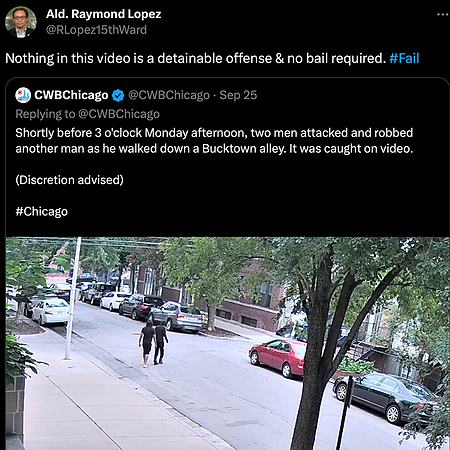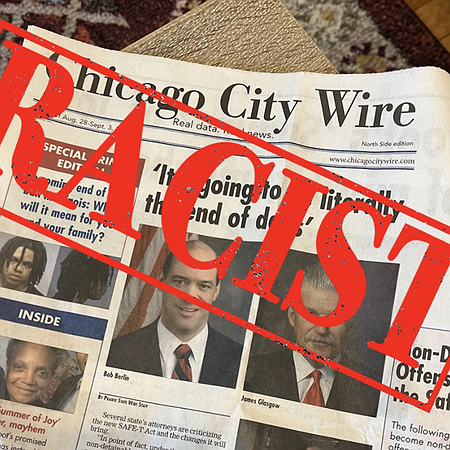The Briefing:

Following the arrest of a man awaiting trial on electronic monitoring, Sheriff Dart claimed his office was unable to track his whereabouts because of the essential movement provisions of the Pretrial Fairness Act.
Fact Check: FALSE
There is nothing in Illinois law requiring the Sheriff to stop tracking individuals on electronic monitoring.

A Will County Judge blamed the Pretrial Fairness Act for his inability to detain Kyleigh Cleveland-Singleton, who has been charged with obstruction of justice, a class 4 non-violent felony. She was not accused of any violence.
Fact Check: FALSE
Class 4 non-violent felony offenses were not detainable offenses even prior to the Pretrial Fairness Act. The only option a judge had under the old system was to order a money bond, which if paid, would guarantee an individual’s release.

In an interview with WSPY News, State’s Attorney Eric Weis suggests that the elimination of cash bail creates a “release and reoffend” cycle that is causing an increase in cases. “You know, certain people can’t be held, so they go out commit crime [sic], get released, they go out and commit a crime, get released, and again, the numbers just continue to go up,” said S.A. Weis.
Fact Check: FALSE
While the Pretrial Fairness Act does eliminate the use of wealth-based pretrial incarceration, and mandates that many arrested individuals are given a chance to succeed on pretrial release, it does not eliminate the court’s ability to jail someone awaiting trial.

“There is no ability to detain a sex offender who has refused to register, a fentanyl dealer, or someone who steals a vehicle, and that is all absurd to me,” said Kankakee County State’s Attorney Jim Row in the Daily Journal.
Fact Check: FALSE
Under the Pretrial Fairness Act, all Class 3 felonies and above are detainable offenses for which someone can be denied release when certain findings are made. Failure to register, distribution of controlled substances, and possession of a stolen vehicle are all felony offenses for which pretrial release may now be denied when certain findings are made—and which were not eligible for detention prior to the new law. Judges could only order a money bond, which if paid, would guarantee an individual’s release. Now judges have the power to deny release altogether when someone poses a risk of intentionally evading prosecution.

Kane County State’s Attorney Jamie Mosser told the Aurora Beacon about a woman with mental health issues who has been repeatedly trespassing at a home and claimed that there is nothing prosecutors can do to keep her away from the house other than for police to cite and release her.
Fact Check: FALSE
Trespass to Residence is a Class A misdemeanor or a Class 4 felony. There is no requirement that police cite and release people for those levels of charges. Even if she was being charged with a lower level version of trespass, police would have been able to arrest this individual during the initial incident had she presented a danger to others. After the initial citation was issued, police could have arrested her if she continued to engage in criminal behavior. Prosecutors would also be able to charge the person with violating the terms of their pretrial release, and a judge could hold them in custody for that violation.

"Under the new system, there's only one option: detention. Otherwise, the individual who is charged with potentially very serious crimes walks out the door without paying a dime." Madison County State's Attorney Tom Haine in the Edwardsville Intelligencer
Fact Check: False
The Pretrial Fairness Act eliminated money bond as a condition of release, but prosecutors can still ask for and judges can still order many other conditions of release.

In an article published by The Patch, aCook County prosecutor and a judge claimed that someone accused of strangulation cannot be denied release under the Pretrial Fairness Act. "It's compelled that the defendant be released," Cook County Judge Anthony Calabrese said.
Fact Check: FALSE
Under the Pretrial Fairness Act, people can be detained for safety reasons if they are accused of a felony that involves the threat of or infliction of great bodily harm or permanent disability or disfigurement. Strangulation would meet this standard.

Alderman Lopez shared a video of someone being assaulted and robbed in Chicago’s Bucktown neighborhood and claimed that “nothing in this video is a detainable offense & no bail required.”
Fact Check: FALSE
The Pretrial Fairness Act permits courts to deny pretrial release to people accused of robbery on the basis of either community safety or evading prosecution.

“It’s absolutely not fair to the victims of crime,” Sen. Terri Bryant said. “From restitution payments to victims services, bonds and fees often contribute to vital services to help victims recover from their trauma.”
Fact Check: FALSE
The vast majority of bond payments are used to pay fees and fines that support government functions. A 2022 report by the Administrative Office of the Illinois Courts and the Civic Federation found that the 95 Illinois counties that provided data collected a total of $83.1 million in bond payments in 2021. Of that, only $2.5 million—just 3%—went to restitution payments.

In an interview with WLS AM, Cook County Sheriff Tom Dart claimed that because of the Pretrial Fairness Act, “two days a week, I have to shut everyone's [electronic monitoring] device off.”
Fact Check: FALSE
The Pretrial Fairness Act guarantees people incarcerated in their homes on electronic monitoring the ability to perform essential tasks such as grocery shopping and laundry, but there is nothing in the law that requires Sheriff Dart to “shut everyone's device off”—nor does he. The Cook County Sheriff’s Office uses GPS devices to track movement and the tracking remains on during essential movement, constantly tracking and recording people’s locations. This statement by Sheriff Dart is intentionally misleading to the public: in spring 2022, WBEZ issued a correction after Sheriff Dart made similar false statements implying that people on electronic monitoring were not monitored during essential movement.

In an interview with WLS AM, Cook County Sheriff Tom Dart called advocates “morons” who tell “unmitigated lie[s]” about his pretrial electronic monitoring program: “Some of these morons…spin this nonsense about home monitoring [that] a poor person can't go to his job—that's an unmitigated lie.”
Fact Check: FALSE
Before the Pretrial Fairness Act, people on pretrial electronic monitoring needed the Sheriff or a judge to approve their “movement” to leave their homes for any amount of time. If a person on electronic monitoring wanted to go somewhere, they had to get documentation and share it with the Sheriff’s Office three days in advance. This process took a notoriously long time, and in many instances, people were arbitrarily denied movement and not given permission to leave their home. In addition, many appointments do not regularly provide the written notices required by the Sheriff’s Office, making it impossible for people to provide documentation.

“However, the other side of that is, there are some people that, regardless of how much money they have or don’t have are violent offenders. They have committed crimes. ... And I think that that is what concerns me the most, that those individuals will be released and be allowed to continue to commit crimes.” Rock Island State’s Attorney Dora Villarreal
Fact Check: False
The presumption of innocence is a hallmark of America’s criminal legal system. Everyone deserves to be treated as innocent while they are awaiting trial. While the Pretrial Fairness Act does eliminate the use of money bond as a means to detain someone and mandates that most arrested individuals are given a chance to succeed on pretrial release, it does not eliminate the court’s ability to jail someone awaiting trial.

“State’s Attorney Hanley's main concern comes with the speedy trial provision potentially letting people with the highest charges walk out of jail before their trial date.”
Fact Check: FALSE
The Pretrial Fairness Act did not change the amount of time prosecutors have to prepare a case. For decades, the court has had 90 days for trial before a person in custody awaiting trial is entitled to release. In reality, it is rare for a serious case to go to trial in that timeframe. The Pretrial Fairness Act actually increased flexibility on this deadline, and now state can receive deadline extensions based on certain situations. The defense also may request extensions.

"It is a big sweeping piece of legislation with no guidance about how implementation works." - Jacksonville Police Chief Adam Mefford
Fact Check: False
The Administrative Office of Illinois Court established the Illinois Supreme Court Pretrial Implementation Task Force in 2020. The Task Force included law enforcement, judges, public defenders, and advocates. For two and a half years, the Task Force prepared numerous resources on how counties can implement each element of the law. In 2022 alone, the Task Force held eight public town hall events and six regional educational summits attended by thousands of people. The Task Force was operational through August 2023 when the Illinois Supreme Court created the Committee on Pretrial Education to provide judges, pretrial officers, and other members of the judicial branch with ongoing education and training.

“We may be in a scenario in which there will be no way to hold a misdemeanor defendant, which is typically your domestic violence cases – unless there’s some type of other circumstances that would make it a felony,” McLean County State's Attorney Erika Reynolds said."
Fact Check: False
In this article, the McLean County State's Attorney falsely stated that misdemeanor domestic violence was non-detaintable, this is false. Under the Pretrial Fairness Act, state's attorneys will be able to request detention in misdemeanor domestic violence cases.

Households across Illinois were delivered fake newspapers riddled with racist dog whistles and misinformation about the Pretrial Fairness Act.
Fact Check: False
The Pretrial Fairness Act will uphold public safety, ensure everyone has access to the presumption of innocence — regardless of their financial status — and reduce the number of people jailed while awaiting trial in Illinois.

Councilwoman Patty Gustin of Naperville misled the public when she claimed that the Pretrial Fairness Act does not allow police to arrest someone for trespassing on private property, even if they are unwilling to leave.
Fact Check: False
Her statement is a clear misinterpretation of the provisions of the law meant to reduce arrests for low-level allegations. Police have complete discretion to decide when someone is an “obvious threat to the community” exists, and will not be barred from arresting anyone who they believe poses a threat to public safety.

Some public officials claimed that after the Pretrial Fairness Act’s implementation in January 2023, all individuals charged with murder who are currently being held in jail due to unpaid money bonds must be released immediately.
Fact Check: False
While the Pretrial Fairness Act does eliminate the use of money bond as a means to detain someone and mandates that most arrested individuals are given a chance to succeed on pretrial release, it does not eliminate the court’s ability to jail someone awaiting trial.

Springfield Police Chief Kenneth Scarlette told the Illinois Times that he believes the Pretrial Fairness Act may embolden “criminals” when they realize they may be less likely to be arrested or held in jail on certain charges.
Fact Check: False
These claims ignore the wealth of evidence from numerous jurisdictions showing that pretrial jailing can be reduced without harming public safety.

State’s Attorneys in Kane, Kendall, and DuPage Counties claimed that the Pretrial Fairness Act does not give prosecutors enough discretion to deny some people pretrial release.
Fact Check: False
The current standards that judges must use when deciding whether someone may be detained pretrial are not substantially different from the new standards that will go into effect with the Pretrial Fairness Act.

The Chicago Tribune published an opinion piece from Illinois State's Attorneys that blamed recent crime spikes on the Pretrial Fairness Act provisions of the SAFE-T Act, which has largely not yet taken effect, and erroneously claimed that it requires the release of all accused people while awaiting trial.
Fact Check: False
The Pretrial Fairness Act will not result in the simple release of every person arrested. Instead, it focuses court resources on serious cases and cases involving allegations of violence. This ensures that a judge considers each person’s circumstances and the allegations against them before deciding to jail them or impose conditions on their release as part of a comprehensive, individualized hearing.

In calling for the repeal of the Pretrial Fairness Act, State Representative Patrick Windhorst misrepresented the legislative process that led to its passage in January 2021, spreading the false narrative pushed by law enforcement and other conservative lawmakers that the bill had been written “in the dark of night."
Fact Check: False
In reality, experts, advocates, stakeholders, and legislators have been transparently discussing the proposed legislation for years—including in subject matter hearings that Representative Windhorst himself participated in.